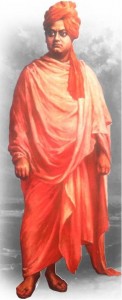Some time back, I came to know that social worker Anna Hazare’s inspiration to serve the country was none other than the great Swami Vivekanand. Since I am a great admirer of Hazare, I became utterly curious to know about the life and teachings of the person who inspired him.
Just when I was thinking of grabbing some book on Vivekananda, I came to know from Ramkrishna Mission (Mumbai) that a play will be staged in Mumbai based on the life of the great disciple of Ramkrishna Paramhansa in order to celebrate his 150th birth anniversary. It would be an understatement to say that I grabbed the opportunity with both hands.
The play is titled Yuganayak Swami Vivekananda. It is conceived and directed by Dr Vikram Panchal while the script is written by Panchal and Qais Jaunpuri.
Among the various defining moments of Vivekananda’s life shown in the play, I would like to highlight the following:-
 Fear: The play starts with Vivekananda stressing the importance of having no fear of anything or anyone in the world. You can say it was an electrifying start to the play since the way the actor uttered the lines, the audience experienced terrific josh which was felt by the huge applause!
Fear: The play starts with Vivekananda stressing the importance of having no fear of anything or anyone in the world. You can say it was an electrifying start to the play since the way the actor uttered the lines, the audience experienced terrific josh which was felt by the huge applause!
Rationalism: Vivekananda wanted a rational proof for the existence of God. It was touching to see his quest to literally see the almighty.
Religion: Vivekananda and his family, although staunch Hindus, had equal respect for other religions like Islam and Christianity.
Caste: After enlightening people at a village, Vivekananda was hungry since three days but nobody offered him food. After three days, he accepted food from a Chamaar (people from the lowest caste). This infuriated and offended the Brahmins (people from the highest caste). Even the Emperor of the kingdom was taken aback by this.
From here on, the way Vivekananda explains the absurdity of the caste system is worth applauding again and again! His simple explanation was – A man should be judged higher or lower according to his karma (deeds) and not birth!
Idol Worship: During a visit in a kingdom, an emperor and his disciples opined to Vivekananda that idol worship is blind faith. According to them, just by giving shape to a stone, how can you consider it as God? To this, Vivekananda got hold of the emperor’s photo and asked one of his disciples to spit on it.
The disciple, along with everyone, was aghast! Vivekananda explains that just as you respect your emperor’s photo as you see him in it; devotees respect the idol as see their God in it.
Western Music: I was really surprised to know that Vivekananda was not only an admirer of western music but also possessed great knowledge in it.
Books: The way Vivekananda highlights the importance of reading books can develop an interest in reading in just anyone.
Encounter with Tata: I was also surprised to see Vivekananda stressing importance of science and technology for the development of the nation while conversing with Jamshedji Tata. His interaction with the founder of Tata industries was one of the most memorable scenes ever!
Chicago: Lastly, there was maximum applause from the crowd when Vivekananda highlighted the importance of Bhagwad Gita and India at Chicago.
After experiencing the play, I can say my perspective towards life has changed and I am feeling a great deal of positivity within me. I wonder what kept me away from such enlightenment all these years. Well, it’s better late than never. Now, I have become a disciple of Swami Vivekananda for life!
Religion: Vivekananda and his family, although staunch Hindus, had equal respect for other religions like Islam and Christianity.
Yes. So?
You have written about his knowledge of western music. He was an accomplished musician in Indian Music and a fine singer too.
I know he was a very good singer but I didn’t know that he was an accomplished musician too. Thanks Dr Sharma. 🙂
Sir we are planning a play of celebration of swami vivekanadas 150 years next year is it possible to get script guidance etc
with thks
What is it you exactly want. There are already several scripts available on Swami Vivekananda and Ramakrishna. You may contact Ramakrishna Mission , Belur Math at Kolkata.
Hi Unnat,
Thanks for the comment. I have sent you a mail. Please check.
Thank you!
Swami Vivekananda, although he denied a low-high of caste system, his views about low caste people are more victim blaming than removing the caste system. His views are more or less like today’s caste apologetic. However towards the end, he somehow has changed his mind, but those thoughts are in letters and not in his books. Hence today’s view co-relates with his victim blaming stand towards lower castes. http://www.dlshq.org/messages/caste.htm
He’d confused between caste and class ( at the time of writing the article mentioned above). He follow the idea of some group to become supreme in the society, which is not what class meant for. Because caste is not a individual thing as he’d implied. Accepting a meal from chamar may be too progressive in those days but it is not equivalent to giving the same respect. It may be evolved from the humanist idea. But certainly he’s done nothing for the abolishment of the caste. In which, still today, we have also failed.